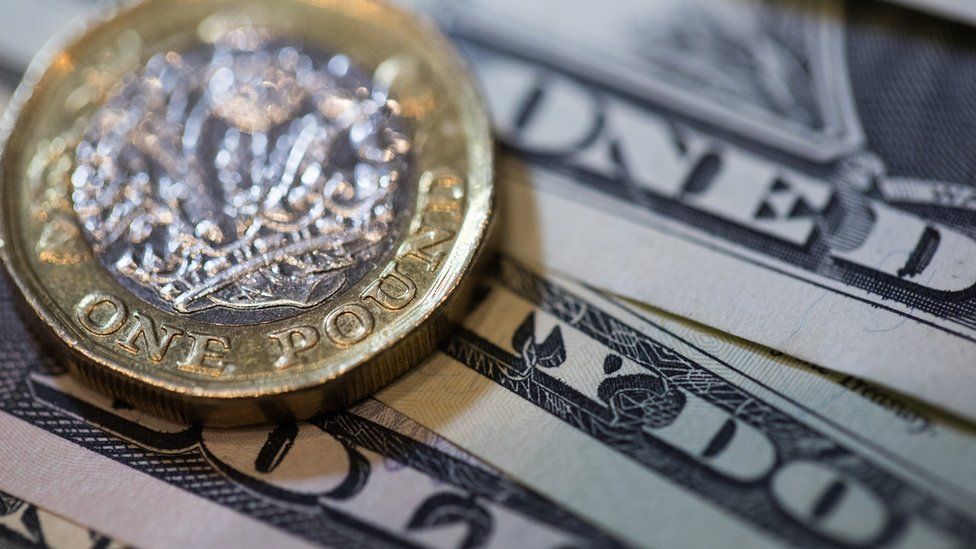The pound: Why is it falling?
- Published

The value of the pound has fallen to a record low against the dollar. It has also fallen against the euro.
It comes after the UK government announced large tax cuts, to be paid for by borrowing billions of pounds.
How does a weak pound affect me?
The pound's value affects everyone - from shoppers to business owners and investors.
This is because when the pound is worth less, the cost of goods imported from overseas goes up.
For example:
- Gas - the price is largely based on the dollar
- Petrol - oil is priced in dollars, so a weak pound can make filling up your car more expensive
- Food prices - the UK imports 46% of the food it consumes
- Technology, like mobile phones, or cars made abroad, could get more expensive
Even things made in the UK can cost more if parts are bought from other countries.
And the pound's value has an impact when you travel abroad. If it buys less of the local currency, then things will be more expensive.
Overall, the falling pound could increase the cost of living by 0.5 percentage points next year, according to Samuel Tombs of research firm Pantheon Economics.
A weak pound can, however, boost businesses which export to other countries as their goods become cheaper and more attractive to foreign buyers.
Why has the pound tumbled?
Investors around the world buy and sell huge amounts of foreign currency. The aim is to profit by buying a currency that goes up in value more than the one sold.
The pound plummeted on Friday after the government announced huge tax cuts in its mini-budget.
It then plunged again in on Monday, reaching $1.04 - the lowest level the pound has ever been against the dollar.
The cause is investors selling the pound because they have doubts about the government's plans, said Jane Foley, of Rabobank.
"They're worried that some of these tax cuts that have been announced aren't going to be fully funded," she said.
These same concerns have also pushed up the cost of government borrowing.
The interest on 10-year bonds - which governments sell to investors - has risen from just over 1% in January, to more than 4% now.
Some investors believe the government's tax cuts will lead to people spending more, which will push up prices. So in an effort to limit price rises, the Bank would raise interest rates sooner and faster.
However, raising rates could leave people with less money, as mortgages and loans become more expensive.
"The markets have decided that [Mr] Kwarteng's tax cuts will lead to higher interest rates and that a deterioration in the public finances will undermine the UK's long-term growth prospects", said Paul Dales from Capital Economics.
The Bank of England isn't set to hold its next interest rate meeting until November, but there is speculation it could act sooner.
In a statement on Twitter, the Bank said it was monitoring developments and would "not hesitate to change interest rates by as much as needed to return inflation to the 2% target".
How are other currencies doing?
The dollar has also performed well against other countries' currencies. Only 24 have outperformed it since the start of the year.
However, the pound has fallen more than 20% against the dollar this year, putting it among the 20 worst performing currencies.
Among the currencies that have performed worse are the Argentine peso (-27%) and the Turkish lira (-29%).
The euro has also fallen against the dollar, by 15% over the same period - the two currencies had the same value this year for the first time in over two decades.
The pound is down against the euro over the same period.
Compared with India's rupee, the pound is down by 13% since the start of the year.
Why is the US dollar so strong?
The fall in the pound comes after a surge in the US dollar's value;
Part of the reason is down to the US being less exposed to high energy prices caused by the Russian invasion of Ukraine.
As such, the US is considered more of a safe haven for investors.
How is currency valued?
Exchange rates -the rates at which currencies are bought and sold - change constantly.
They are affected by lots of things, including:
- Economy: Successful economies have strong currencies because other countries want to invest there. They need the local currency to do so, pushing up demand and its value
- Savings: If the Bank of England raises interest rates, holding savings or investments in pounds usually becomes more attractive and increases demand for sterling
- Prices: If UK goods are cheaper than those abroad, they are attractive to foreign businesses who need sterling to purchase them. This will tend to push up the exchange rate
- Public finances: The state of a government's bank balance, or how much debt it has, can also affect the exchange rate
- Speculation: The exchange rate is highly vulnerable to currency speculators, who buy and sell sterling based on expectations of future events
Has your business been affected by the falling value of the pound? Share your experiences by emailing [email protected].
Please include a contact number if you are willing to speak to a BBC journalist. You can also get in touch in the following ways:
- WhatsApp: +44 7756 165803
- Tweet: @BBC_HaveYourSay
- Upload pictures or video
- Please read our terms & conditions and privacy policy
If you are reading this page and can't see the form you will need to visit the mobile version of the BBC website to submit your question or comment or you can email us at [email protected]. Please include your name, age and location with any submission.